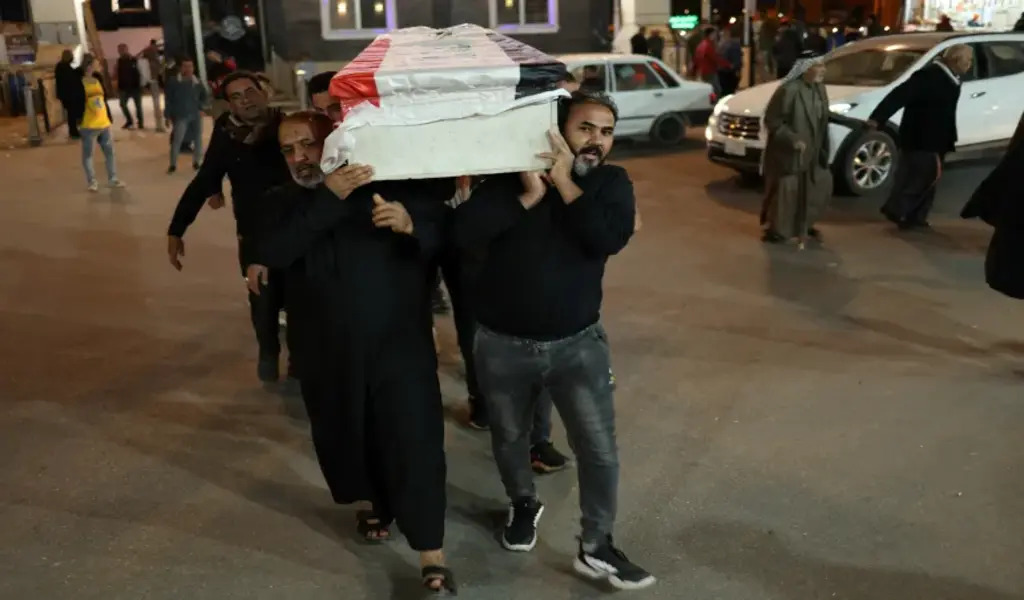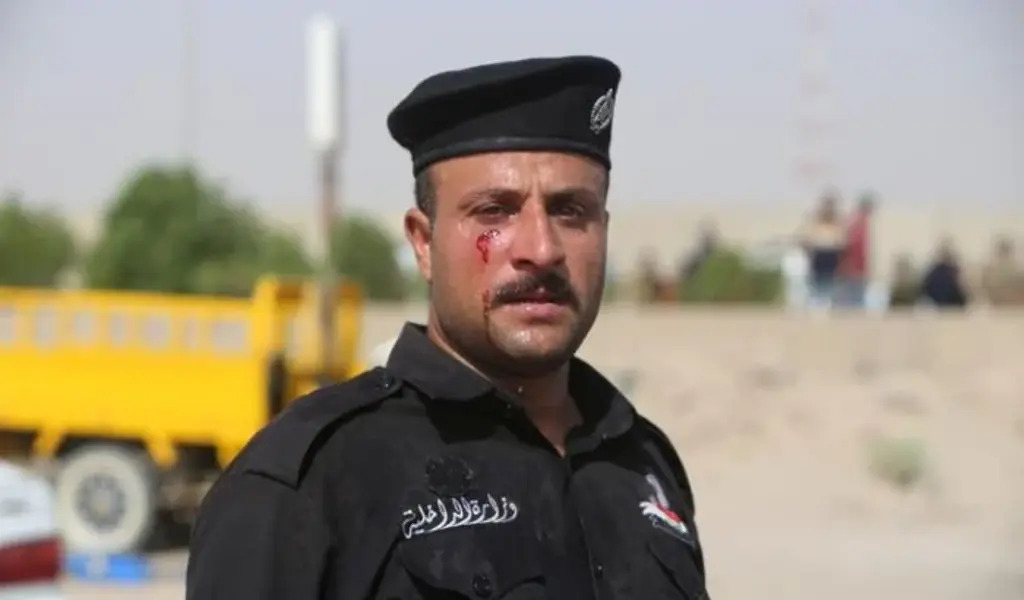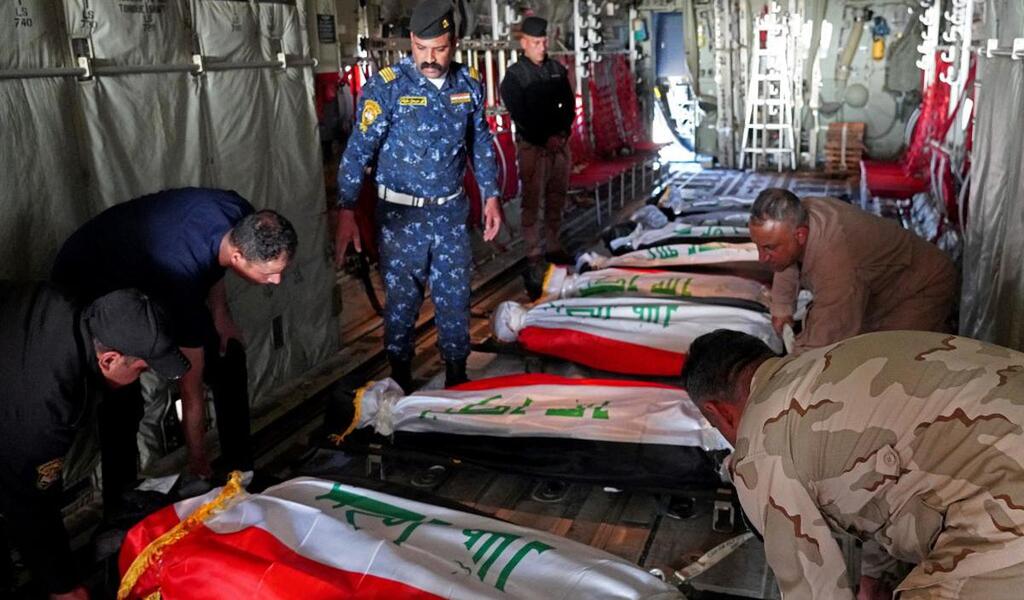News Asia
An Explosion Near Kirkuk Killed At Least 9 Iraqi Police Officers

(CTN NEWS) – KIRKUK – According to two security sources, at least nine Iraqi federal policemen were murdered on Sunday when a bomb exploded in their convoy southwest of the oil-rich city of Kirkuk.
According to the source, the explosion happened close to Safra town, located around 30 kilometers southwest of Kirkuk. The source also stated that two additional officers were badly injured.
According to a statement from his office, Iraqi Prime Minister Mohammed Shia al-Sudani has ordered a search for the “terrorist elements” responsible for the incident and sent the federal police commander to the region for more inquiry.

Mourners in Najaf, Iraq, carry the coffin of a policeman killed in an attack in Kirkuk on December 18, 2022 [REUTERS/Alaa Al-Marjani]
The police unit that was patrolling the region was targeted by IS militants, according to Iraqi police personnel, who used roadside bombs in the attack.
Under the condition of anonymity, a federal police officer who linked the attack to the IS told AFP that a truck carrying the men was the initial target of a bomb blast.
He continued, “A direct attack with small guns” then occurred close to the settlement of Chalal al-Matar.
The officer said the attack injured two cops and added, “An attacker has been killed and we are looking for the others.”
Seven police, including one officer, were slain in the incident, according to a Ministry of Interior official in Baghdad.

A wounded Iraqi cop during a protest at the entrance to giant Zubair oilfield near Basra, July 17.— Reuters
The IS conquered huge portions of Iraqi and Syrian territory starting in 2014, establishing a harsh “caliphate,” which they oversaw until being routed by Iraqi forces supported by a US-led military coalition in late 2017.
IS lost its final stronghold in Syria, close to the Iraqi border, in 2019.
Although the US-led anti-IS coalition stopped conducting combat operations in Iraq in December of last year, about 2,500 American soldiers are still stationed there as trainers.
However, there are still active IS relics in several Iraqi provinces.
Security forces in Baghdad are still engaged in counterterrorism operations against the organisation, and it is frequently reported that airstrikes and raids have resulted in the deaths of IS fighters.
According to a UN report published earlier this year, the IS may still draw on an underground network of between 6,000 and 10,000 fighters to carry out attacks on both sides of the porous Iraqi-Syrian border.

/GETTY IMAGE
Despite the losses that have reduced the organization to a ghost of its former self.
Three Iraqi troops were killed on Wednesday in the countryside north of Baghdad when a roadside bomb struck a military vehicle.
The blast in a location where IS sleeper cells are known to congregate was not immediately claimed.
Four troops were murdered last month in a machine gun attack on a remote military outpost in northern Iraq, according to a military source. No one immediately took the blame.
The first such attack in the city in more than three years occurred in January 2021 when two suicide bombers attacked a market in Baghdad, killing 32 people. IS immediately claimed credit for the attack.
RELATED CTN NEWS:
Israel Deports French-Palestinian Human Rights Lawyer ‘Salah Hammouri’ Back To France
News Asia
Bangladesh Supreme Court to Rule on Controversial Job Quotas Amid Nationwide protests

(CTN News) – The future of public service hiring regulations, which have provoked national conflicts between police and university students that have resulted in at least 133 fatalities so far, is set to be decided by Bangladesh’s Supreme Court on Sunday, or today.
Later in the day, the nation’s highest court will meet to declare its decision about the controversial job quotas—either in favor of or against their elimination.
This week’s protests over politically motivated admission quotas for highly sought-after government posts turned into some of the worst instability during Prime Minister Sheikh Hasina’s watch.
Due to the ongoing turmoil, a curfew has been in place since Friday. In addition, the government has declared a two-day holiday during which all offices and institutions would be closed.
After riot police were unable to restore order, soldiers are now policing cities throughout Bangladesh, and since Thursday, there has been a statewide internet blackout that has severely limited the flow of information to the outside world.
SEE ALSO: Nearly 1,000 Indian Students Return from Bangladesh Amid Deadly Unrest Over Job Quota System

Hasina made hints to the public this week that the plan will be abandoned, which comes after her opponents accuse her government of using the judiciary to further its own agenda.
However, a positive decision is unlikely to calm the nation’s simmering rage in the wake of the intensifying crackdown and growing dead toll.
Business owner Hasibul Sheikh, 24, told AFP, “It’s not about the rights of the students anymore,” while observing a Saturday street demonstration in the capital city of Dhaka against a statewide curfew.
“Our demand is one point now, and that’s the resignation of the government,” he stated.
A system that reserves more than half of civil service positions for particular groups, like as children of veterans of the 1971 war, is the driving force behind the upheaval this month.
Hasina, 76, has ruled the nation since 2009 and won her fourth consecutive election in January following a ballot in which there was no real competition, according to critics who claim the program helps families who support her.

Rights organizations accuse Hasina’s government of abusing state institutions, including as the extrajudicial assassination of opposition activists, in order to strengthen its grasp on power and quell dissent.
Bangladesh’s 170 million people lack access to sufficient employment possibilities, therefore the quota system is a major cause of anger for recent graduates who are struggling to find work.
“The government’s actions have made the situation worse, rather than trying to address the protesters’ grievances,” Pierre Prakash, Asia director of Crisis Group, told AFP.
After a week of increasing violence, Hasina canceled her intentions to depart the nation on Sunday for a diplomatic trip to Spain and Brazil.
Source: The Indian Express
News Asia
Pakistani Government Plans to Ban PTI

(CTN News) – The Pakistani government has announced measures to outlaw Pakistan Terheek-e-Insaf (PTI), the party of imprisoned former Prime Minister Imran Khan.
Information Minister Attaullah Tarar made the declaration on Monday, only days after the Supreme Court declared the PTI eligible for a share of reserved seats in national and provincial assemblies.
After reviewing all relevant information, the government has decided to ban PTI. “We will file a case to ban the party,” he said, citing claims such as inciting violent protests last year and leaking confidential information.
Tarar stated that the case would be moved to the Supreme Court.
He also stated that the government intended to file treason charges against Khan and two other senior party leaders, former President of Pakistan Arif Alvi and ex-Deputy Speaker of the National Assembly Qasim Suri, as well as a review appeal against the Supreme Court’s ruling that the PTI should be allocated some assembly seats reserved for women and members of religious minorities.

According to Sayed Zulfiqar Bukhari, a top PTI politician and party spokesperson, the government’s action “betrays their complete panic”.
“After realizing that they could no longer threaten, compel, or blackmail judges, they decided to make this move through the cabinet. “All of their attempts to stop us have been declared illegal by the courts,” he stated.
Last week, the Supreme Court recognized the PTI as a political party and confirmed that the party’s lack of an electoral emblem did not affect its legal right to field candidates.
The verdict was in response to the PTI being barred from competing in parliamentary elections in February using its party emblem, the cricket bat, forcing it to field candidates as independents.
Despite the setback, PTI-backed candidates emerged as the largest parliamentary bloc, winning 93 seats.
After Khan declined to cooperate with his political opponents, the Pakistan Muslim League-Nawaz (PMLN) and Pakistan People’s Party (PPP) formed a coalition government with other smaller parties.
Ex-Governor Sindh Zubair, who formerly served in the PMLN, stated that the government’s action was in response to the Supreme Court’s ruling last week and warned of political upheaval ahead.
“The powers that be are trying to disenfranchise the largest majority of voters of the country, who voted for PTI,” he disclosed to Al Jazeera.

Khan was appointed prime minister in August 2018 but was dismissed from power in April 2022 after a parliamentary vote of no-confidence.
The cricketer-turned-politician has since faced a slew of legal issues, including charges of misplacing and leaking the contents of a confidential cable delivered to Islamabad by Pakistan’s then-ambassador in the US in 2022.
Khan has continually disputed the charge, claiming that the dossier contained evidence that his resignation as prime minister was orchestrated by his political opponents and the country’s powerful military, with assistance from the US administration. Both Washington and Pakistan’s army deny the accusation.
Despite multiple recent court verdicts in his favor, Khan has been in prison since August of last year.
Source: Aljazeera
News Asia
NAB Re-Arrests Imran Khan and Bushra Bibi After Iddat Case Conviction Overturned

(CTN News) – Former Prime Minister Imran Khan and his wife, Bushra Bibi, were acquitted in the Iddat case by a sessions court on Saturday, less than 24 hours after the Supreme Court ruled in favor of the PTI in reserved seats.
However, their relief was short-lived when Imran Khan was detained by the National Accountability Bureau (NAB) for selling official goods. Bushra Bibi was also rearrested in this case while being released from Adiala Jail’s Gate No. 3.
According to sources, the NAB detained Bushra Bibi after the bureau’s chairman issued arrest warrants for her and Imran Khan. Both are to be investigated in Adiala Jail.
Opposition leader Omar Ayub Khan condemned Bushra Bibi’s imprisonment and criticized the Adiala Jail administration. He also cautioned the jail superintendent of the repercussions and announced that a privilege motion would be filed against him.
Imran Khan and Bushra Bibi were acquitted in the Iddat case after Additional District and Sessions Judge (ADSJ) Mohammad Afzal Majoka reversed their previous verdict, which sentenced them to seven years in prison on February 3, five days before the general election.
Imran Khan’s lawyers, Usman Gill and Zaheer Abbas, were in court when the verdict was pronounced.
In the 28-page ruling, Judge Majoka rejected Khawar Fareed Maneka, Bushra Bibi’s ex-husband,’s arguments that Imran Khan and Bushra Bibi’s nikah was illegally performed and that Mr. Maneka was denied Buju (reconciliation rights) under religious law.
The court also rejected the allegation of fornication under provision 496-B of the Pakistan Penal Code (PPC), stating that no charge was filed under this provision against both Imran Khan and his spouse “because there was no evidence of a second witness”. The trial court heard only one witness, Mr Maneka’s domestic servant.
“In these circumstances, it cannot be said that the appellants committed fornication,” the judge wrote. Regarding the charge of contracting marriage fraudulently during the Iddat period, the judge found that in a video given as evidence during the trial, Mr. Maneka lauded his ex-wife, Bushra Bibi, and “deposed that his ex-wife is a pious lady.”
The magistrate inquired about “how this witness [Mr Maneka] can claim that the appellant No. 2 [Bushra Bibi] committed fraud with him” .
The court announced its decision: “From a perusal of Section 496 PPC and the above-mentioned esteemed citations, this court is of the view that the appellants have not gone through any marriage ceremony fraudulently or with dishonest intention because none of the parties claimed that nikah was not performed and fraudulently he or she was supposed to believe that marriage ceremony was solemnised.”
The court judgment added: “In the instant instance, it is the complainant’s case that the appellants’ nikah was done on January 1, 2018, followed by the second nikah in February 2018. By no stretch of the imagination, it was a marriage with dishonest or deceptive intentions.”
Regarding Mr. Maneka’s claim that he was denied reconciliation rights and so deceived by Imran Khan and Ms. Bibi, the court noted that during cross-examination, Mr. Maneka stated that he learned of the appellants’ marriage on the second day of their nikah.
Before submitting the complaint, the judge questioned why Mr Maneka had been silent on his reconciliation rights for six years.
The judge stated, “The complainant has failed to prove his case against the appellants.” As a result, both appeals filed by appellants No. 1 [Imran Khan] and No. 2 [Bushra Bibi] are accepted, the judgment of the learned trial court of February 3, 2024, is overturned, and both appellants are acquitted of the accusation.”
The court ordered their freedom unless they needed to be imprisoned in other cases.
Source: DAWN
-

 News3 years ago
News3 years agoLet’s Know About Ultra High Net Worth Individual
-
Entertainment2 years ago
Mabelle Prior: The Voice of Hope, Resilience, and Diversity Inspiring Generations
-

 Health3 years ago
Health3 years agoHow Much Ivermectin Should You Take?
-

 Tech2 years ago
Tech2 years agoTop Forex Brokers of 2023: Reviews and Analysis for Successful Trading
-

 Lifestyles2 years ago
Lifestyles2 years agoAries Soulmate Signs
-

 Movies2 years ago
Movies2 years agoWhat Should I Do If Disney Plus Keeps Logging Me Out of TV?
-

 Health3 years ago
Health3 years agoCan I Buy Ivermectin Without A Prescription in the USA?
-

 Learning2 years ago
Learning2 years agoVirtual Numbers: What Are They For?
